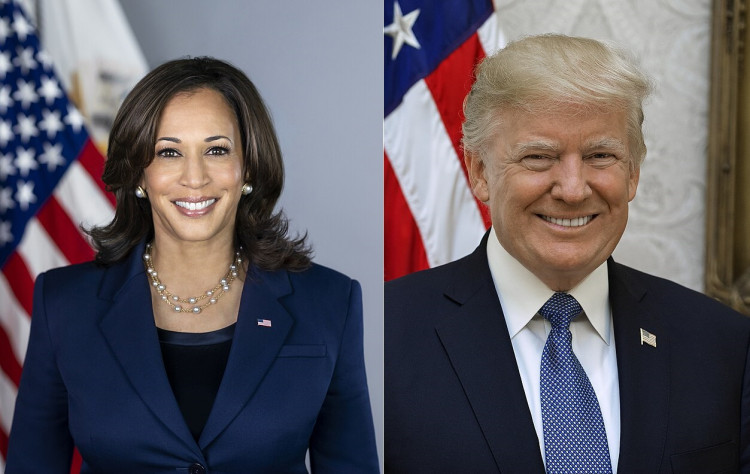As the race for the White House approaches its final stretch, a new poll from the Atlanta Journal-Constitution (AJC) and the University of Georgia reveals that former President Donald Trump holds a slight lead over Vice President Kamala Harris among likely voters in Georgia. The poll, conducted from October 7 to 16, shows Trump ahead by 47% to Harris' 43%, with a margin of error of 3.1%. With just two weeks remaining before Election Day, 8% of voters remain undecided, underscoring the volatility of the contest in this key battleground state.
The survey results mark a pivotal moment in the 2024 presidential race, highlighting the increasingly competitive dynamic between the two candidates. Georgia, which has emerged as one of the most critical swing states, played a decisive role in the 2020 election. Now, with both Trump and Harris vying for its 16 electoral votes, the outcome in Georgia could be a bellwether for the national race.
Trey Hood, a political scientist at the University of Georgia who oversaw the poll, emphasized that neither candidate can claim a clear victory at this point. "Neither side has this in the bag," Hood told the AJC, noting that the next two weeks will be crucial. The poll results show a stark divide along racial and gender lines, as well as significant concerns over issues like inflation, jobs, and the economy.
The poll reveals that 74% of Black voters support Harris, while 8% plan to vote for Trump. However, 18% of Black voters remain undecided, a potentially decisive group in a state where African American turnout has historically played a key role. In contrast, 66% of white voters back Trump, compared to 28% for Harris, with 4% undecided. The gender gap is also evident: 59% of men support Trump, while 55% of women back Harris.
Despite Harris' strong support from Black voters and women, the poll indicates that Trump has made gains among several demographic groups that could swing the state. Trump is receiving overwhelming support from Republicans, with 95% backing him, and conservatives, with 80% pledging their vote. Harris enjoys similarly robust support among Democrats, with 88% of liberals and Democrats backing her campaign.
Inflation and economic concerns dominate voters' priorities in Georgia. According to the poll, 19% of respondents identified inflation and the rising cost of living as their top issue, followed closely by jobs and the economy at 17%. Preserving democracy and immigration also ranked highly at 17% and 14%, respectively. Abortion, which was expected to be a major issue, was cited by only 8% of respondents.
The AJC/University of Georgia poll comes a month after an earlier poll showed Trump and Harris virtually tied in Georgia. Since then, Trump's numbers have edged upward, giving him a slight advantage. Nationally, Trump's poll numbers have also been improving, with several key polling models now predicting that the former president is the slight favorite to win the election. For the first time, forecasting aggregator 538 gave Trump a 53% chance of victory over Harris, while the Decision Desk HQ/The Hill forecast model puts Trump's chances at 52%.
Despite Trump's improving numbers, experts caution that the race remains highly unpredictable. G. Elliott Morris, a forecaster with 538, pointed out that while Trump's odds have improved, the race is still too close to call. "A [53]-in-100 chance for Trump is not all that different from a 58-in-100 chance for Harris-both are little better than a coin flip for the leading candidate," Morris wrote. He noted that just a few strong polls for Harris could shift the momentum back in her favor.
Nationally, Harris continues to lead Trump in polling averages, but her advantage has been shrinking. As of late October, Harris holds a narrow 1.8-point lead over Trump in 538's national polling aggregate. This represents a slight dip from her previous lead of 2.4 points earlier in the month. Meanwhile, RealClearPolitics shows Harris leading by just 0.9 points, down from 1.6 points two weeks ago.
The polling data from Georgia aligns with national trends that show Trump making gains in key battleground states. In the seven swing states expected to decide the election, including Georgia, both candidates are locked in tight races. Harris holds a slim lead in states like Michigan and Wisconsin, while Trump is ahead in Georgia, North Carolina, and Arizona. In Pennsylvania, one of the most critical swing states, Trump and Harris are virtually tied.
As Election Day approaches, both campaigns are focusing their efforts on mobilizing voters and turning out key constituencies. For Trump, the challenge will be to maintain his momentum and solidify his lead among white voters and conservatives. For Harris, securing undecided voters, particularly in the African American community, will be essential to her chances in Georgia and across the country.






